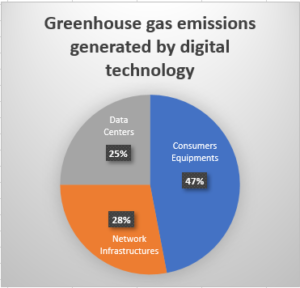
The environmental impact of digital technology
09.05.2023 /
CSR, or Corporate Social Responsibility, refers to the voluntary commitment of companies to take into account the social and environmental impacts of their activities. CSR encompasses several areas: environment protection, diversity and inclusion promotion, respect for human rights and social standards, promotion of transparency and accountability, etc.
Aware of the importance of these issues for future generations, Octogone Gestion’s management has, for example, adopted environmental policies (Green Charter in 2022 and mobility reflection in 2023) and encouraged employee volunteering with local associations (2023).
CSR concerns have evolved over time. In particular, they have shifted towards considering the impact of technology and digital technology on the environment, as the growing use of information and communication technologies (ICT) and the Internet has an increasingly important impact on our planet.
It is undeniable that digital technology has positive effects, as connected objects, robotics and artificial intelligence provide significant development potential to help achieve the goals of sustainable development and more efficient use of available energy and natural resources.
However, it is important to consider the adverse effects of digital, such as:
- Energy consumption: the data centers required to store and process digital data have an extremely high energy consumption.
- Greenhouse gas emissions: energy consumption by ICT and data centers also leads to greenhouse gas emissions, including CO2. According to some estimates, the digital sector emits about 2% of the world’s greenhouse gas emissions, which is as much as the airline industry.
- Use of natural resources: the production and management of digital equipment requires the use of natural resources such as metals and minerals, which may be exhaustible or difficult to extract in environmentally friendly conditions.
- Waste management: end-of-life digital equipment can contain toxic substances that are difficult to recycle, such as lead, mercury and plastic, posing significant environmental and health challenges.
How can we reduce our digital environmental footprint?
There are several actions we can take, such as extending the lifespan of our devices by choosing refurbished products and choosing environmental labels for computer equipment. We can also remove all unnecessary software from our phones, which are very energy consuming.
To limit our digital energy consumption, we can put our computer on standby after 3 minutes without use and turn it off during extended breaks.
Emails contribute to increasing our environmental footprint, especially when the attachments are large and the number of people copying them is high. Storing them also consumes energy, which is why it is advisable to regularly sort through our e-mails and delete SPAM automatically. It is also recommended to have light electronic signatures, without high-definition images. Finally, if a colleague is nearby, it is better to go and see him/her in person rather than sending an e-mail.
Cloud storage centers require constant trips back and forth between our terminal and the servers, which consumes twice as much energy as storing data locally for a year.
These seemingly minor actions are really just habits we can adopt to reduce our ecological footprint.
Sibilla La Spina, Communications Officer
Image source: https://www.wwf.fr/agir-au-quotidien/numerique

